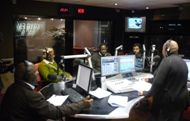 Small- to medium-scale, context-specific community ‘interventions’ can help generate meaningful discussion of local problems. Community radio is one of the most powerful interventions or media for getting out information, starting discussion and raising awareness about development issues, such as the effect of the AIDS epidemic and gender inequality on local communities.
Small- to medium-scale, context-specific community ‘interventions’ can help generate meaningful discussion of local problems. Community radio is one of the most powerful interventions or media for getting out information, starting discussion and raising awareness about development issues, such as the effect of the AIDS epidemic and gender inequality on local communities.
“The radio enables people to engage in dialogue about their daily challenges and living conditions in general,” said Mr Sekao Mosemanetau, station manager of Vaaltar FM, in South Africa’s North West Province. “It also contributes to the defence of cultural and linguistic diversity beneficial to human development for all”.
Vaaltar is one of a dozen carefully selected community radio stations participating in a long-term project that Sonke is implementing with the support of the Canadian Government (CIDA). Sonke wants to use community radio the ideas of its flagship One Man Can (OMC) programme out as widely as possible. Started in April, the radio project is part of Sonke’s ‘Communication for Social Change’ strategy, which uses various media to promote change in attitudes and behaviour regarding gender and HIV.
“One of the principles in doing this work is to build a movement of social ideas, encourage dialogue among community members and create a platform for local voices to be heard,” said Thami Nkosi, one of the Sonke project trainers. “There is a great sense of optimism particularly from the local community-based organisations who have enthusiastically bought into the OMC campaign and are taking the project to the next level.”
The project also aims to use radio broadcasting as a means to increase the involvement of men and boys in preventing HIV transmission and gender-based violence, and in promoting gender equality. The project should also enable Sonke to help develop synergies between local radio stations and local organisations serving the same communities. ‘Listeners seem to like and appreciate community radio stations especially when subjects that they care about are aired’, said Mr Sandile Ngcobo, station manager at Newcastle Community Radio, KwaZulu Natal. “One of our major plans is to also consider collaborating with local community-based organisations in ‘flighting’ programmes that are gender sensitive.”
Sonke provides stations with locally relevant radio materials. Sonke has just redone for radio ten of its (several dozen) video Digital Stories, which are first-person accounts of loss, pain and triumph. The stories, created together with the California-based Center for Digital Storytelling, have been translated into English, isiXhosa, isiZulu and seSotho. Initial pilot testing with radio stations in August sparked lively ‘on air’ discussions about sensitive topics, like disclosing HIV status.
Sonke has conducted combined trainings for municipal officials and staff from both community organisations and nine of the radio stations. The trainings were intended to equip participants with the know-how to address gender, gender-based violence and HIV/Aids issues. “Our radio programme presenters have shown great willingness to mainstream the One Man Can campaign information into talk shows”, Mr Ngcobo said.
During the yearly international 16 days of Activism against Violence against Women and Children (starting November 25), partner radio stations will broadcast a series of shows discussing the work Sonke does, including its One Man Can and Red Card against Child Sexual Exploitation campaigns. Sonke will also help the stations work with the 16 Days activities of community organizations.
Starting in January, Sonke will assist the radio stations and community organizations to do live talk radio shows. Quarterly stakeholders meetings are scheduled during 2011 to ensure regular discussion of new OMC elements. “Our interaction with the radio stations has been very exciting so far,” said Helen Alexander, Sonke’s Communications and Strategic Information Manager, who heads the radio project. “And we are looking forward to strengthening and deepening our engagements with them over the next 18 months of the project”.
Participating stations:
- Motheo FM and QwaQwa Radio (Free State)
- Vukani Community Radio, Khanya Community Radio and Nqubela Community Radio (Eastern Cape)
- Izwi Lomzansi FM, Maputuland Community Radio and Newcastle Community Radio in (KwaZulu Natal)
- Witbank Community Radio and Greater Middleburg FM (Mpumalanga)
- Greater Lebowakgomo Community Radio (Limpopo)
- Vaaltar FM (North West)

